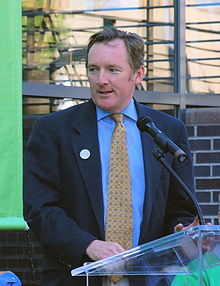The Oregon Department of Transportation is in a tough spot after it tried to justify highway expansion projects by saying they would cut greenhouse gas emissions. ODOT's bogus claims helped sink a $350 million transportation funding package in the state legislature, and even some of the state's Republican lawmakers are calling for agency director Matt Garrett's head. What's a beleaguered state DOT to do?

David Bragdon, former head of Portland's regional planning agency, Metro (he now runs the New York-based nonprofit TransitCenter), has some suggestions, and they're relevant to other state DOTs too.
In a recent opinion piece in the Statesman Journal, Bragdon said voters and elected officials shouldn't cave to the DOT's pleas for more funding until its "transportation governance and management problem" gets fixed. Nor, says Bragdon, should the state DOT be allowed to direct the inquiry into its own flaws, which he says would be like "asking the board of United Airlines to report on why United Airlines performs poorly."
Instead, he proposes two key reforms. First, give more authority over roads and bridges to the most local level of government that is practical. In other words, let cities decide for themselves how to spend transportation funds. And in a related idea, he says Oregon should abolish its arbitrary transportation funding split -- in which the state keeps 50 percent of funding, 30 percent goes to county governments, and another 20 percent goes to local governments:
Oregon can develop a new, rational funding allocation method that discards the current non-strategic distribution based on outdated agency entitlements, and replace it with one based on spending money where it brings the highest return for Oregonians, regardless of what level of government is spending it. The current conflict of interest of allowing the state highway division to be simultaneously both a competitor with local government for federal funds and an arbiter of where federal funds go must also be ended.
Simply replacing the top people, or locating a new source of funding won't fix what's broken and restore public trust, Bragdon writes:
While other states move ahead, Oregon has stuck with a balkanized and irrational transportation governance model. Glowing danger signals like chronically flawed forecasts, under-maintenance of core assets and increasing debt should alarm anyone concerned with Oregon’s competitiveness.
Systemic mismanagement is a sign there is something wrong with the system, not just with management. Oregon will only get back on the road when bold leaders recognize that governance reform is the only way to optimize the public’s investment in transportation.
Oregon is far from the only state that would benefit from this advice. Cash-strapped DOTs in Missouri, Georgia, and plenty of other states need to get their house in order and reform the highway obsession that's breaking their budgets.





